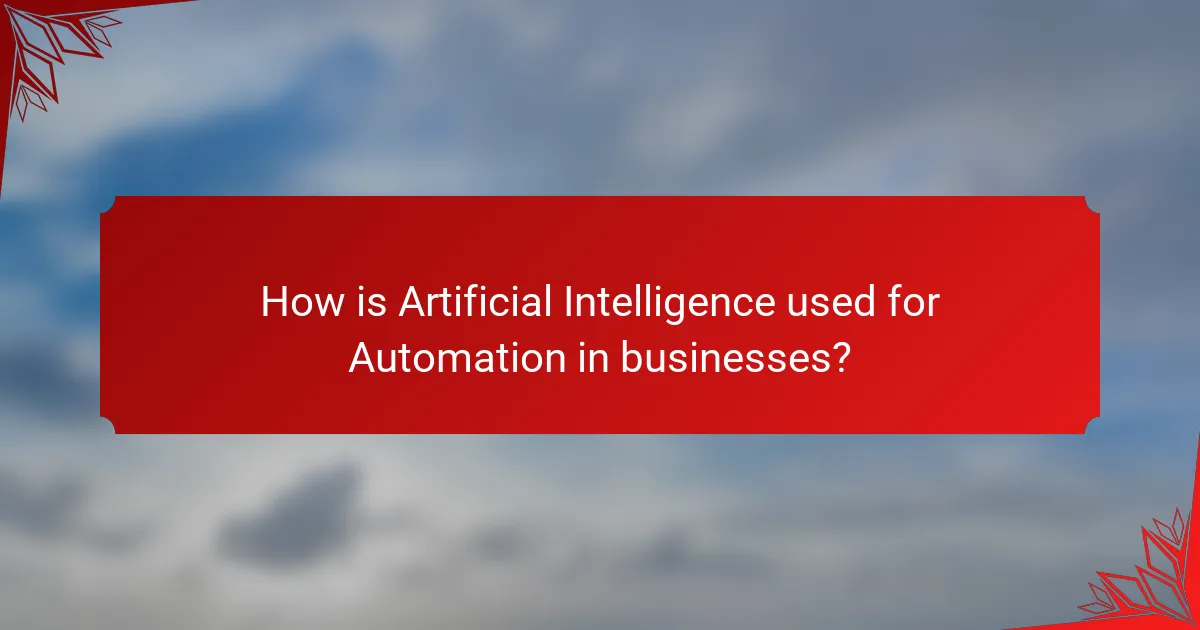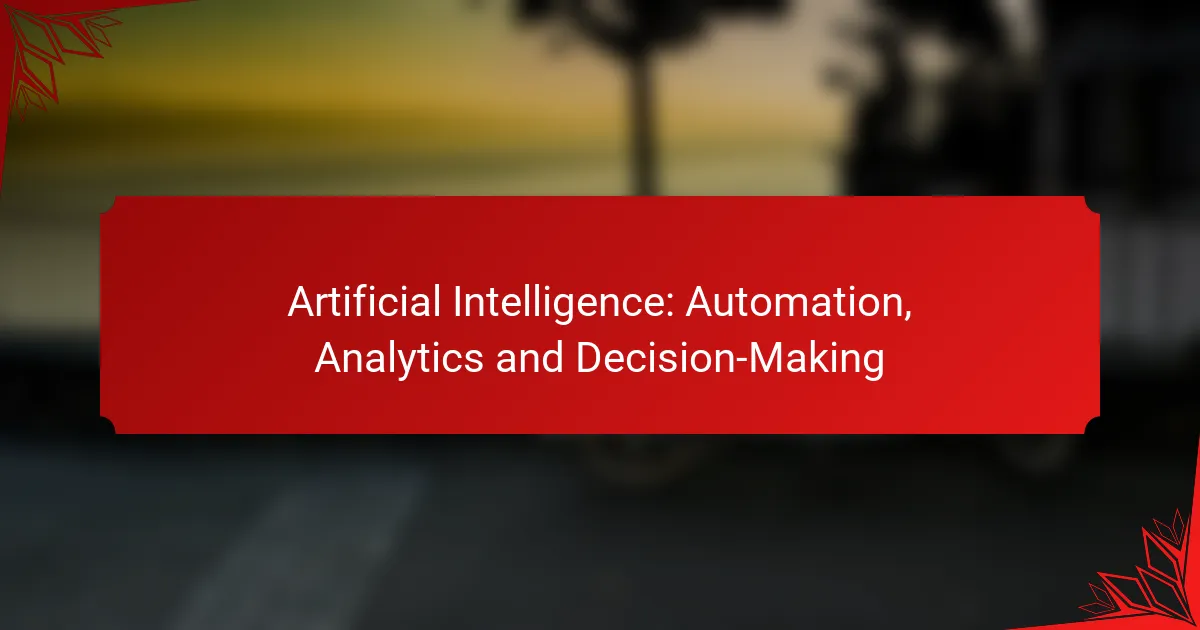Artificial Intelligence (AI) plays a crucial role in modern businesses by automating repetitive tasks, enhancing operational efficiency, and minimizing human error. It also improves analytics by delivering deeper insights and real-time data processing, which empowers organizations to make informed decisions swiftly. By harnessing algorithms and machine learning, AI systems analyze vast datasets to predict outcomes, thereby reducing uncertainty in decision-making processes.

How is Artificial Intelligence used for Automation in businesses?
Artificial Intelligence (AI) is leveraged in businesses for automation by streamlining repetitive tasks, enhancing efficiency, and reducing human error. Through various technologies, AI automates processes that traditionally require human intervention, allowing organizations to focus on strategic initiatives.
Robotic Process Automation (RPA)
Robotic Process Automation (RPA) involves using software robots to automate routine tasks across applications. RPA can handle data entry, invoice processing, and report generation, significantly speeding up operations while minimizing errors. Businesses often implement RPA to reduce costs and increase productivity.
When considering RPA, it’s crucial to identify processes that are rule-based and high-volume. Common pitfalls include underestimating the complexity of integration with existing systems and neglecting change management for affected employees.
Intelligent Automation Platforms
Intelligent Automation Platforms combine RPA with advanced technologies like machine learning and natural language processing. These platforms can adapt to changes in data and improve over time, enabling more complex decision-making processes. They are particularly useful for tasks that require some level of cognitive function, such as customer service inquiries.
Organizations should evaluate their specific needs when choosing an intelligent automation solution. It’s essential to ensure that the platform can integrate seamlessly with existing workflows and that staff are trained to work alongside these technologies.
Case Studies in Manufacturing
In manufacturing, AI-driven automation has led to significant improvements in production efficiency. For instance, companies have implemented AI to monitor machinery, predict maintenance needs, and optimize supply chains. These applications have resulted in reduced downtime and lower operational costs.
One notable example is a major automotive manufacturer that utilized AI to automate quality control processes. By deploying machine learning algorithms, they enhanced defect detection rates, which led to a decrease in rework and scrap rates.
AI in Supply Chain Management
AI plays a critical role in supply chain management by automating inventory management, demand forecasting, and logistics optimization. By analyzing vast amounts of data, AI can predict trends and adjust supply chain operations accordingly, leading to more efficient resource allocation.
Companies using AI in their supply chains often experience improved accuracy in order fulfillment and reduced lead times. However, it is vital to continuously monitor AI systems to ensure they adapt to changing market conditions and customer preferences.

What are the benefits of AI in Analytics?
AI enhances analytics by providing deeper insights, improving predictive capabilities, and enabling real-time data processing. These benefits help organizations make informed decisions based on accurate and timely information.
Enhanced Data Insights
AI algorithms analyze vast amounts of data to uncover patterns and trends that may not be immediately visible. This capability allows businesses to gain a comprehensive understanding of customer behavior, market dynamics, and operational efficiencies.
For instance, retailers can use AI to analyze purchasing patterns, leading to better inventory management and targeted marketing strategies. By leveraging these insights, companies can optimize their operations and enhance customer satisfaction.
Predictive Analytics Capabilities
AI-powered predictive analytics uses historical data to forecast future outcomes, helping organizations anticipate trends and make proactive decisions. This approach can significantly reduce risks and improve strategic planning.
For example, financial institutions can apply predictive models to assess credit risk, while healthcare providers can predict patient admissions based on historical data. These applications enable organizations to allocate resources more effectively and enhance service delivery.
Real-time Data Processing
AI facilitates real-time data processing, allowing businesses to react swiftly to changing conditions. This capability is crucial in environments where timely decisions can lead to competitive advantages.
In sectors like finance and e-commerce, AI can process transactions and analyze user behavior instantaneously, enabling personalized experiences and fraud detection. Companies that harness real-time analytics can improve operational efficiency and enhance customer engagement.

How does AI improve Decision-Making?
AI enhances decision-making by providing insights derived from vast amounts of data, enabling organizations to make informed choices quickly and accurately. By leveraging algorithms and machine learning, AI systems can analyze patterns and predict outcomes, significantly reducing the uncertainty involved in decision processes.
Data-Driven Decision Frameworks
Data-driven decision frameworks utilize quantitative data to guide business choices, ensuring that decisions are based on evidence rather than intuition. These frameworks often involve collecting relevant data, analyzing it, and interpreting the results to inform strategic actions.
Implementing a data-driven approach requires establishing clear metrics and key performance indicators (KPIs) that align with business objectives. Organizations should prioritize data quality and consistency to enhance the reliability of their decisions.
AI-Powered Decision Support Systems
AI-powered decision support systems (DSS) integrate artificial intelligence with traditional decision-making processes to provide recommendations and insights. These systems can process large datasets in real-time, allowing decision-makers to evaluate various scenarios and outcomes efficiently.
When selecting an AI-powered DSS, consider factors such as ease of integration with existing systems, user interface design, and the ability to customize algorithms for specific business needs. Common pitfalls include over-reliance on automated suggestions without human oversight and neglecting to update the system with new data regularly.

What are the key criteria for selecting AI tools?
When selecting AI tools, it’s essential to consider factors such as scalability, integration capabilities, and cost-effectiveness. These criteria help ensure that the chosen solutions align with your organizational needs and can deliver tangible benefits over time.
Scalability of Solutions
Scalability refers to the ability of an AI tool to handle increasing amounts of work or to be easily expanded. When evaluating scalability, consider whether the tool can grow with your business needs without significant additional costs or resource investments.
For example, a cloud-based AI solution might offer flexible pricing tiers that allow you to start small and expand as your data volume or user base increases. Look for tools that can accommodate future demands without requiring a complete overhaul.
Integration with Existing Systems
Integration is crucial for ensuring that new AI tools work seamlessly with your current systems. Assess whether the AI solution can connect with your existing software, databases, and workflows to avoid disruptions and maximize efficiency.
Tools that offer APIs or pre-built connectors to popular platforms can significantly reduce implementation time and complexity. Ensure that the integration process is straightforward and does not require extensive customization, which can lead to increased costs and delays.
Cost vs. ROI Analysis
Conducting a cost versus return on investment (ROI) analysis helps determine the financial viability of an AI tool. Consider both the upfront costs, such as licensing fees and implementation expenses, and ongoing costs, including maintenance and support.
Evaluate the potential benefits, such as increased productivity or reduced operational costs, to estimate the ROI. A good rule of thumb is to aim for an ROI that justifies the investment within a reasonable timeframe, typically within one to three years.

What are the leading AI platforms for businesses?
The leading AI platforms for businesses include IBM Watson, Google Cloud AI, and Microsoft Azure AI. These platforms offer a range of tools and services that help organizations automate processes, analyze data, and enhance decision-making capabilities.
IBM Watson
IBM Watson is a comprehensive AI platform that provides businesses with advanced analytics, natural language processing, and machine learning capabilities. It is particularly known for its ability to analyze large datasets and generate insights that can inform strategic decisions.
Key features include Watson Assistant for building conversational interfaces and Watson Discovery for extracting valuable information from unstructured data. Companies often use Watson in sectors like healthcare, finance, and customer service to improve efficiency and customer engagement.
Google Cloud AI
Google Cloud AI offers a suite of machine learning and AI tools designed to integrate seamlessly with existing Google Cloud services. This platform is ideal for businesses looking to leverage powerful analytics and scalable machine learning models.
With features like AutoML, businesses can build custom machine learning models without extensive coding knowledge. Google Cloud AI is widely used for applications such as image recognition, natural language processing, and predictive analytics, making it suitable for various industries.
Microsoft Azure AI
Microsoft Azure AI provides a robust set of AI services that enable businesses to build, train, and deploy machine learning models. The platform is known for its user-friendly interface and integration with other Microsoft services, making it accessible for organizations of all sizes.
Azure AI includes tools like Azure Machine Learning and Cognitive Services, which allow users to implement AI solutions for tasks such as speech recognition and anomaly detection. Companies often choose Azure for its flexibility and strong support for enterprise applications.

How is AI transforming industries in North America?
AI is significantly reshaping industries across North America by enhancing efficiency, improving decision-making, and driving innovation. From automating routine tasks to providing deep analytics, AI technologies are enabling businesses to operate more effectively and respond to market demands swiftly.
Healthcare Innovations
In the healthcare sector, AI is revolutionizing patient care through predictive analytics and personalized treatment plans. Machine learning algorithms analyze patient data to identify health risks and suggest preventive measures, improving outcomes and reducing costs.
For instance, AI-driven diagnostic tools can process medical images faster and often more accurately than human radiologists, leading to quicker diagnoses. Hospitals utilizing AI technologies can see reductions in patient wait times and operational costs, enhancing overall service delivery.
Financial Services Automation
AI is transforming financial services by automating processes such as fraud detection, risk assessment, and customer service. Algorithms can analyze transaction patterns in real-time to flag suspicious activities, significantly reducing the incidence of fraud.
Moreover, chatbots powered by AI are increasingly used in customer support, providing instant responses to inquiries and improving customer satisfaction. Financial institutions adopting these technologies can enhance operational efficiency and reduce labor costs, allowing them to focus on strategic initiatives.



